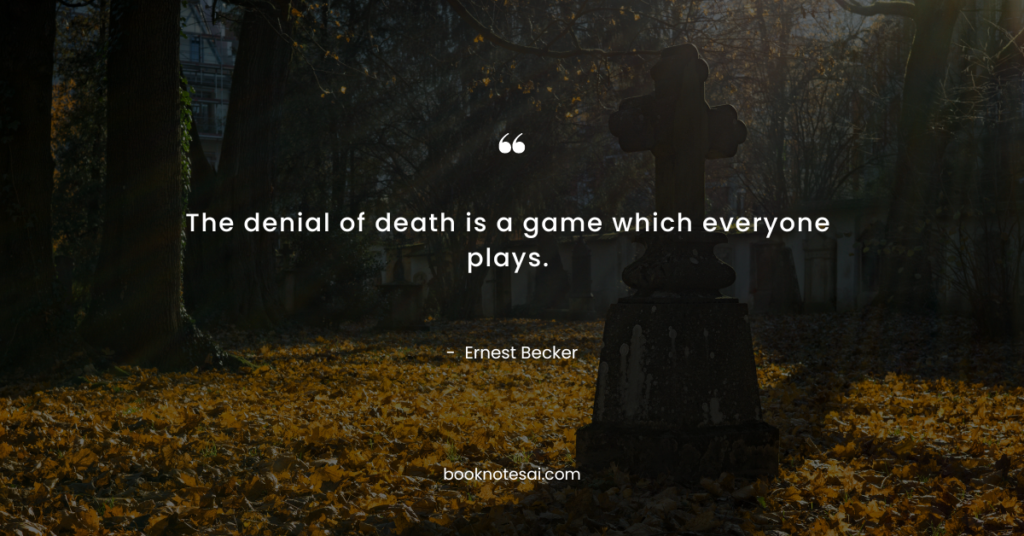Listen To This Post
The Birth and Death of Meaning Summary: Understanding the Human Quest for Significance.

This is a book summary for The Birth and Death of Meaning by Ernest Becker. The essential information is structured to be practical, clear, and really helpful, while also saving you a bunch of time.
Introduction: Why this book?
- Delve into the profound exploration of human existence through The Birth and Death of Meaning by Ernest Becker, offering a deep understanding of our quest for significance.
- Becker’s insights into the human psyche and the pursuit of meaning provide invaluable perspectives that can reshape your understanding of life’s purpose.
The Birth and Death of Meaning Summary:
- Ernest Becker’s seminal work explores the human condition, tracing our relentless pursuit of meaning amidst the looming specter of mortality.
- Through various disciplines including psychology, sociology, and anthropology, Becker elucidates how our awareness of death shapes our behaviors, beliefs, and cultural constructs.
- He argues that human civilizations arise as symbolic defense mechanisms against the terror of death, seeking to transcend mortality through cultural symbols, rituals, and societal structures.
- Becker’s analysis underscores the paradoxical nature of human existence, wherein our pursuit of significance often leads to the very anxiety and neuroses we seek to escape.
- Ultimately, The Birth and Death of Meaning invites readers to confront existential truths and navigate the tension between the desire for immortality and the realities of human finitude.
💡 5 Big Ideas
- The Denial of Death: Becker contends that human civilization is driven by a collective denial of mortality, fueling the construction of cultural symbols and belief systems to mitigate existential anxiety.
Embracing the awareness of death can liberate individuals from the shackles of symbolic immortality, fostering authentic living. - Terror Management Theory: Becker’s insights laid the groundwork for Terror Management Theory, which explores how awareness of mortality influences human behavior.
Understanding the mechanisms of terror management empowers individuals to navigate existential concerns and cultivate meaningful lives. - Cultural Symbolism: Becker highlights the pivotal role of cultural symbols in assuaging existential dread, demonstrating how societal constructs shape individual identity and worldview.
Recognizing the symbolic nature of reality enables individuals to deconstruct inherited beliefs and forge authentic paths to self-discovery. - Transcendence and Mortality: By embracing mortality, individuals can transcend the limitations of ego-driven pursuits and materialism, fostering deeper connections with others and the world around them.
Embracing vulnerability and impermanence enriches life experiences and fosters genuine relationships. - Legacy and Meaning: Becker underscores the importance of legacy as a means of transcending mortality, prompting individuals to cultivate enduring contributions and meaningful connections beyond their finite existence.
Investing in relationships and pursuits that outlast the self imbues life with profound purpose and fulfillment.
In summary, Becker’s exploration of existential themes illuminates the human condition and offers profound insights into the quest for meaning and significance.
Powerful Quotes
- “The idea of death, the fear of it, haunts the human animal like nothing else.”
This quote emphasizes the profound impact of mortality on human consciousness, driving our relentless pursuit of meaning and significance. - “Man is literally split in two: he has an awareness of his own splendid uniqueness in that he sticks out of nature with a towering majesty, and yet he goes back into the ground a few feet in order blindly and dumbly to rot and disappear forever.”
This quote underscores the existential paradox of human existence, highlighting our dual nature as beings of grandeur and mortality. - “The irony of man’s condition is that the deepest need is to be free of the anxiety of death and annihilation; but it is life itself which awakens it, and so we must shrink from being fully alive.”
This quote poignantly captures the existential dilemma faced by humanity, as the pursuit of life’s fullness often confronts us with the specter of mortality. - “The concept of greatness entails the recognition that one has the potential to transcend the limitations of the self and make enduring contributions to the world.”
This quote underscores the transformative power of greatness, inspiring individuals to transcend personal constraints and embrace their capacity for meaningful impact. - “The irony of man’s condition is that the deepest need is to be free of the anxiety of death and annihilation; but it is life itself which awakens it, and so we must shrink from being fully alive.”
This quote encapsulates the existential paradox of human existence, wherein the pursuit of vitality is tempered by the awareness of mortality. - “The denial of death is a game which everyone plays.”
This quote succinctly captures the pervasive nature of death denial in human society, underscoring our collective efforts to evade existential truths. - “The idea of death, the fear of it, haunts the human animal like nothing else.”
This quote underscores the omnipresent fear of mortality that shapes human consciousness and drives our quest for significance. - “The idea of death, the fear of it, haunts the human animal like nothing else.”
This quote highlights the profound impact of mortality on human consciousness, driving our relentless pursuit of meaning and significance. - “The irony of man’s condition is that the deepest need is to be free of the anxiety of death and annihilation; but it is life itself which awakens it, and so we must shrink from being fully alive.”
This quote poignantly captures the existential dilemma faced by humanity, as the pursuit of life’s fullness often confronts us with the specter of mortality. - “The concept of greatness entails the recognition that one has the potential to transcend the limitations of the self and make enduring contributions to the world.”
This quote underscores the transformative power of greatness, inspiring individuals to transcend personal constraints and embrace their capacity for meaningful impact.
One Reason To Read This Book:
Delve into The Birth and Death of Meaning to embark on a profound journey of self-discovery, confronting existential truths that redefine the contours of human existence.
Who should I recommend The Birth and Death of Meaning Summary to?
This summary of The Birth and Death of Meaning is recommended for individuals grappling with questions of purpose and identity, as well as professionals in psychology, philosophy, and sociology seeking profound insights into the human condition.
Recommendations:
- “The Denial of Death” by Ernest Becker – A seminal work expanding on Becker’s exploration of mortality and human behavior.
- “Man’s Search for Meaning” by Viktor E. Frankl – Offers profound insights into finding purpose and meaning in the face of suffering.
- “The Courage to Be” by Paul Tillich – Explores the existential courage required to confront the anxieties of existence and embrace authentic living.
This summary serves as a complimentary guide to the reviewed title The Birth and Death of Meaning, offering key insights. For a deeper understanding, we encourage you to explore the full book.


